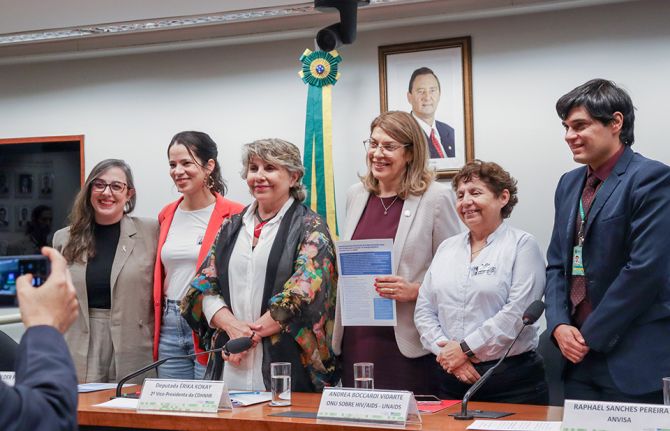
Feature Story
Two decades of engagement in the response to HIV in Brazil
14 October 2019
14 October 2019 14 October 2019Seven years after finding out that he was living with HIV, Jair Brandão was waiting for a medical appointment in a clinic in Recife, north-east Brazil, when a fellow patient informed him he could access psychosocial support at a nearby nongovernmental organization. Although it had taken him many years to accept his HIV status, he needed just three sessions of counselling to realize that he was meant to become an HIV activist.
“I was thrilled and scared at the same time, because I didn’t understand much about political spaces, nor about AIDS and health policies. I didn't know how to engage in political discussion,” recalls Mr Brandão, who two decades later is one of Brazil’s most influential HIV activists. “First, I had to accept myself as a person living with HIV, and this was one of the challenges. And then learn about the virus, take care of myself. Only after that did I start to learn about social and political issues.”
Mr Brandão says he believes that being an activist is natural for him. “Some people are born for that,” he says. “Being an activist is about being restless and not accepting injustices and violations of rights. I think I was born with this gift because I always led processes, even without knowing it was activism, and I was always concerned about helping and empowering others.”
After participating in three of the four United Nations high-level meetings on AIDS and in the 2018 high-level meeting on tuberculosis, Mr Brandão knows how difficult it is to engage in dialogues with other civil society peers and country representatives. His mother tongue is Portuguese, which is not an official United Nations language. “Speaking a foreign language is a major issue for us in Brazil, so we have to know at least Spanish. Very few activists know English fluently enough to be able to make interventions in these spaces.”
In July 2019, Mr Brandão was among the nongovernmental organization delegates at the High-Level Political Forum on Sustainable Development in New York, United States of America, representing RNP+ (the Network of People Living with HIV and AIDS) and his own nongovernmental organization, Gestos: Soropositividade, Comunicação e Gênero.
“It is essential for civil society to participate in the national implementation and monitoring processes of the 2030 Agenda for Sustainable Development effectively. We cannot achieve the Sustainable Development Goals without the full participation of civil society,” he says. “Defending the AIDS agenda also requires discussing other equally important and cross-cutting issues.”
Through his role as Project Adviser at Gestos and as a member of RNP+, Mr Brandão also leads the People Living with HIV Stigma Index 2.0 project in Brazil. With his peers at Gestos and other national networks of people living with HIV, and with the support of the United Nations Development Programme and UNAIDS, he helped train 30 people on interviewing techniques in seven Brazilian cities. In two months, they gathered information about HIV-related stigma and discrimination by conducting around 1800 interviews. The initial results will be released before the end of November.
“This process strengthened the activists who conducted the interviews because they could listen to and experience the stories that many people have been through and could not until now share with anyone,” he recalls. “We are in the fourth decade of the AIDS epidemic and still there is a lot of stigma and discrimination. The Stigma Index 2.0 is an instrument which gives us evidence of that in Brazil. We will be able to advocate for stigma-free, zero discrimination HIV policies and services.”
Mr Brandão says he believes in the power of collaboration and partnership to achieve social progress.
“The solidarity and spirit of community that helped create the AIDS movement must come back in our actions and hearts,” he says. “Rethinking strategies and creating new ways to bring about change is fundamental. Empowering new activists, especially young people, is critical. Young people need to be welcomed and open to receive information from experienced AIDS activists. It’s time to join forces, not to be divided.”



